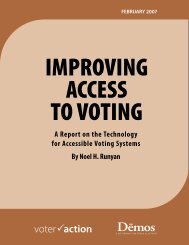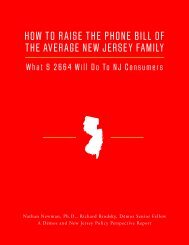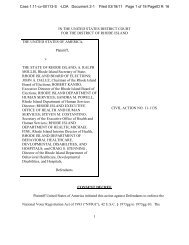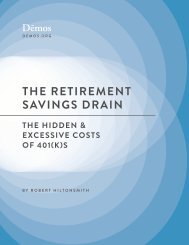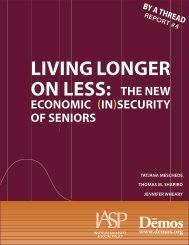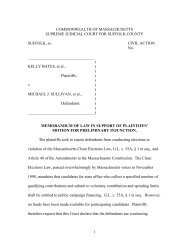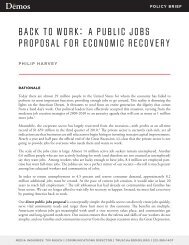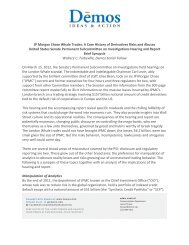Bullies at the Ballot Box - Demos
Bullies at the Ballot Box - Demos
Bullies at the Ballot Box - Demos
You also want an ePaper? Increase the reach of your titles
YUMPU automatically turns print PDFs into web optimized ePapers that Google loves.
least one additional screen from frivolous challenges<br />
by requiring an initial assessment by <strong>the</strong> boards of<br />
elections. Fur<strong>the</strong>rmore, <strong>the</strong> directive st<strong>at</strong>es th<strong>at</strong> mail<br />
returned as “undeliverable” is insufficient grounds<br />
to grant a challenge. 147 The directive also st<strong>at</strong>es th<strong>at</strong><br />
evidence of a foreclosure action is also insufficient<br />
to grant a challenge. 148 These are outstanding and<br />
important safeguards against voter caging, because<br />
<strong>the</strong>y explicitly prohibit <strong>the</strong> use of undeliverable mail to<br />
challenge voter rights. Widespread caging campaigns<br />
frequently use this technique, which can produce<br />
inaccur<strong>at</strong>e and flawed results. These protections<br />
safeguard <strong>the</strong> rights of voters facing foreclosures in <strong>the</strong><br />
wake of <strong>the</strong> largest recession in a gener<strong>at</strong>ion.<br />
Unfortun<strong>at</strong>ely, <strong>the</strong> 2012 directive failed to<br />
carry over language from <strong>the</strong> 2008 directive th<strong>at</strong><br />
explicitly required <strong>the</strong> challenger to bear <strong>the</strong> burden of<br />
proving why <strong>the</strong> challenge is justified with “clear and<br />
convincing evidence.” 149 Also, <strong>the</strong> challenger should be<br />
required to make <strong>the</strong> challenge under o<strong>at</strong>h.<br />
Pennsylvania<br />
The laws in Pennsylvania are problem<strong>at</strong>ic and among<br />
<strong>the</strong> worst examined for this report. First, Pennsylvania<br />
law has two procedures. One allows pre-Election Day<br />
challenges by affidavit, and <strong>the</strong> o<strong>the</strong>r by petition. 165<br />
As for <strong>the</strong> affidavit procedure, <strong>the</strong> law is silent as<br />
to when <strong>the</strong> challenge must be made. 166 This could<br />
lead to serious administr<strong>at</strong>ive burdens if mass voter<br />
challenges are filed in <strong>the</strong> immedi<strong>at</strong>e run-up to Election<br />
Day. For challenges by petition, those must be filed<br />
no l<strong>at</strong>er than 10 days before <strong>the</strong> election. 167 In both<br />
cases, Pennsylvania law is challenger-friendly and does<br />
not adequ<strong>at</strong>ely protect <strong>the</strong> rights of those challenged<br />
inappropri<strong>at</strong>ely.<br />
Any voter in Pennsylvania may be challenged<br />
through an affidavit by a “commissioner, registrar or<br />
clerk or by a qualified elector of <strong>the</strong> municipality.” 168<br />
The challenger is required to file <strong>the</strong> affidavit<br />
explaining <strong>the</strong> “reason” for th<strong>at</strong> challenge but is under<br />
no oblig<strong>at</strong>ion to provide any documentary evidence<br />
or anything to substanti<strong>at</strong>e <strong>the</strong> alleg<strong>at</strong>ions. 169 This is<br />
problem<strong>at</strong>ic because it could lead to indiscrimin<strong>at</strong>e<br />
and flimsy reasons for a challenge even though <strong>the</strong><br />
complaint takes <strong>the</strong> form of an affidavit. Moreover,<br />
once an affidavit challenge is made <strong>the</strong> burden shifts<br />
to <strong>the</strong> challenged voter to justify why she should<br />
stay on <strong>the</strong> rolls. The challenged voter must respond<br />
in a written, sworn st<strong>at</strong>ement, and must produce<br />
“such o<strong>the</strong>r evidence as may be required to s<strong>at</strong>isfy<br />
<strong>the</strong> registrar or commissioner as to <strong>the</strong> individual’s<br />
qualific<strong>at</strong>ions as a qualified elector.” 170 This is<br />
highly problem<strong>at</strong>ic. While <strong>the</strong> challenger is under<br />
no oblig<strong>at</strong>ion to provide any documentary evidence<br />
to support an alleg<strong>at</strong>ion th<strong>at</strong> a voter is improperly<br />
registered o<strong>the</strong>r than an affidavit, a challenged voter<br />
must produce evidence over and above an affidavit<br />
to s<strong>at</strong>isfy a government official th<strong>at</strong> she is lawfully<br />
registered. This could provide onerous for voters who<br />
are targets of caging or o<strong>the</strong>r frivolous challenges,<br />
with little to no burden on <strong>the</strong> challenger. Only if <strong>the</strong><br />
“challenged individual establishes to <strong>the</strong> s<strong>at</strong>isfaction<br />
of <strong>the</strong> commission” her right to be registered is <strong>the</strong><br />
m<strong>at</strong>ter is resolved in favor of remaining registered. 171<br />
O<strong>the</strong>rwise, <strong>the</strong> registr<strong>at</strong>ion shall be cancelled. 172<br />
Similarly, for challenge by petition, any<br />
qualified elector may petition <strong>the</strong> commission to cancel<br />
or suspend <strong>the</strong> registr<strong>at</strong>ion of any o<strong>the</strong>r elector but<br />
must do so under o<strong>at</strong>h or affirm<strong>at</strong>ion. 173 The petition<br />
must set forth “sufficient grounds for <strong>the</strong> cancell<strong>at</strong>ion,”<br />
and include ei<strong>the</strong>r a) notice of <strong>the</strong> time and place<br />
when <strong>the</strong> petition would be given personally to <strong>the</strong><br />
challenged elector <strong>at</strong> least 24 hours prior to filing; or<br />
b) a st<strong>at</strong>ement th<strong>at</strong> <strong>the</strong> challenged voter “could not<br />
be found” <strong>at</strong> <strong>the</strong> challenged voter’s residence and<br />
listing <strong>the</strong> person th<strong>at</strong> lives <strong>at</strong> th<strong>at</strong> residence who “has<br />
declared th<strong>at</strong> <strong>the</strong> person was well acquainted” with<br />
<strong>the</strong> name of everyone living <strong>at</strong> <strong>the</strong> residence and <strong>the</strong><br />
challenged voter no longer resided <strong>at</strong> th<strong>at</strong> address. 174<br />
Then, upon receipt of <strong>the</strong> petition, <strong>the</strong> commission is<br />
required to cancel or suspend <strong>the</strong> registr<strong>at</strong>ion “unless<br />
<strong>the</strong> registered elector so registered appears and shows<br />
cause why this action should not be taken.” 175 Again,<br />
this is highly problem<strong>at</strong>ic and rife with opportunities<br />
for disenfranchisement. It is good th<strong>at</strong> personal<br />
service or a sworn o<strong>at</strong>h <strong>at</strong>testing to hearsay about an<br />
individual’s residence is required to be made in <strong>the</strong><br />
petition. However, autom<strong>at</strong>ic cancell<strong>at</strong>ion procedures<br />
and shifting <strong>the</strong> burden of proof to <strong>the</strong> challenged<br />
voter, are unacceptable. These procedures may lead a<br />
September 2012 | <strong>Bullies</strong> <strong>at</strong> <strong>the</strong> <strong>Ballot</strong> <strong>Box</strong> • 15




